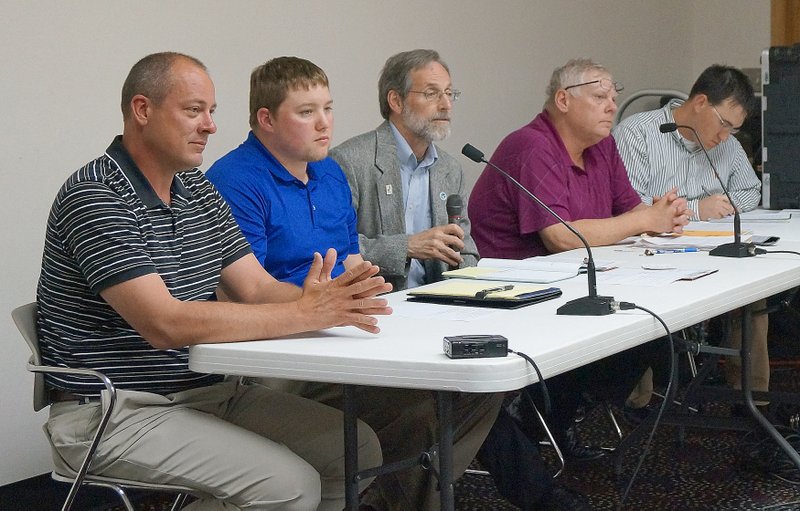People from Goodman met Monday with a panel from the Missouri Department of Natural Resources to discuss the proposal for a concentrated chicken feeding operation northeast of the city.
The panel consisted of: Greg Caldwell, environmental specialist; John Madras, Water Protection Program director; Brooks McNeill, environmental specialist; Gordon Wray, environmental specialist; and Jake Falkner, Water Protection Program unit chief.
Roger Renner proposes to construct four 55-foot-wide by 600-foot-long broiler houses and four 55-foot-wide by 550-foot-long broiler houses. The houses, he said, will hold an operating capacity of 372,056 broiler chickens.
On Wednesday, Renner -- who said he attended Monday's meeting -- declined to comment for this story.
Caldwell talked about the permit process, statutes and regulations regarding concentrated animal feed operations. Caldwell said the decision to allow permits for CAFOs such as the proposed chicken farm passes through various divisions to assure all requirements are met.
One of the initial steps is notifications going out to people who live in the vicinity of the proposed CAFO. A woman in the audience, Francis Hare, said she lives across the street from the location of the proposed factory, but she has not received any notification.
Caldwell said a permit for the factory will not be issued until everyone who should receive notifications receives them. The DNR panel said notifications to neighboring residents are the responsibility of the applicant proposing the operation rather than DNR.
Caldwell said anyone not receiving notifications who should have received them will be given 30 days to submit their comments.
The microphone was then turned over to the people of Goodman who passionately expressed their protests, concerns and questions regarding Roger Renner's proposal.
There were concerns about the depletion of ground water by three wells to be drilled to supply water to the chickens, effects on water quality, runoff problems, contamination due to waste from the chickens, and quality of air due to odors emitted from the buildings.
Goodman Mayor Greg Richmond addressed the DNR panel about his concerns regarding road damage due to the use of industrial vehicles used by the chicken farm, noting that residents should not have to pay for that.
Bobby Anglin, a land developer in the vicinity of the proposed factory, asked "Who is going to control the odor?" Caldwell responded that "there are no odor regulations." He said the buffer zone is designed to "help the odors dissipate."
Attorney Jordan Paul pointed out to the DNR panel that discretion is important. He said to the panel "You are fully able to deny this proposal for the chicken factory. I ask that you deny the permit by using your discretion."
Bill Miller questioned Renner's litter amounts. He asked if antibodies will be tested, where the litter will go and who is constructing the buildings.
A 14-year-old boy stepped up to the mic and asked, "Where is Renner?" Although at the meeting, Renner didn't respond.
Bob Ebbinghaus said to the DNR panel, "My family has lived on this land since the 1900s. This gentleman wants to earn a living at the expense of everyone in this room. Now, my property is in jeopardy. We should have the right to live a normal life."
Connie Brown spoke regarding what the approval of the chicken factory would mean for area residents and how adversely it would affect them. She said people have already been run off the road by vehicles working on the site. She provided everyone at the meeting with a map showing the groundwater level decline in Southwestern Missouri.
"If you want to call George's Chicken to tell them how you feel about them signing Mr. Renner to a contract on property with the only access through a residential area, putting children's lives in danger and threatening your drinking water, their toll free number is 800-800-2449," she said.
Approximately 150 people attended the meeting. Mayor Richmond said, "There are many more people as well as those here tonight who will be affected by the chicken farm, 10 to 15 times the number of people at this meeting will be affected."
People asked the DNR panel who would look at the chicken houses once built to assure they meet requirements, who is going to keep Renner honest, does anyone actually count the number of chickens, who is ensuring public safety. The panel responded that they do not have enough staff and they would depend on the people living near the proposed farm to let them know about what they see.
The DNR panel said it will take 30 to 45 days to make a decision whether Renner's proposal will be approved.
For more information about concentrated animal feeding operations regarding state statutes and regulations, EPA regulations, to view general permits, operating permit application process, and the Nutrient Management Technical Standard, visit the Missouri DNA website at dnr.mo.gov/env/wpp/cafo.
For information regarding air pollution and odor, contact the Air Pollution Control Program at 800-361-4827.
General News on 04/28/2016
